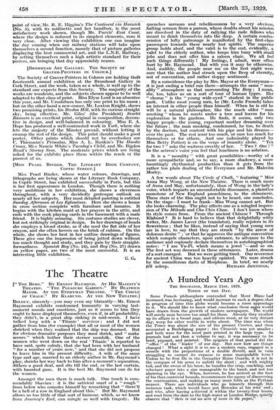The Theatre
[" THE BERG." BY ERNEST RAYMOND. AT HIS MAJESTY'S THEATRE. " THE PLEASURE GARDEN." BY BEATRICE MAYOR. AT THE EVERYMAN THEATRE. " THE CIRCLE OF CHALK." BY KLABUND. AT THE NEW THEATRE.]
BOLDLY, sincerely---you may even say blatantly—Mr. Ernest Raymond exhibits condemned humanity in varying last- moment moods and emotions, just as it seems to him they ought to have displayed themselves, even if, in all probability, they didn't, in a great ship sinking in mid-ocean. • I have talked long with a Titanic ' survivor ; and I did not gather from him (for example) that all or most of the women shrieked when they realized that the ship was doomed. But for 'obvious dramatic purposes they must shriek, and " make Scenes " which bother their sterner menfolk. One of the women who went down on the real ' Titanic' is reported to have said, quite calmly, that she had been with her husband " for a number of years now," and that she did not propose to leave him in the present difficulty. A wife of the same type and age, married to an elderly author in Mr. Raymond's play, shrieks her way back to him after a moment's separation, dithers a good deal, and sits till the end, or the last curtain, with haunted gaze, It is the best Mr. Raymond can do for the women.
Amongst the men there is much talk. One touch is com- mendably Shavian : it is the satirical snarl of a " rough " from below who consoles himself by remarking that " there'll be a hell of a row in England about this." But Mr. Raymond allows us too little of that sort of humour, which, as we know from Journey's End, can mingle so well with tragedy. He quenches sarcasm and rebelliousness by a very obvious, halting sermon from a parson, whose doubts about his mission are dissolved in the duty of rallying the rude fellows who meant to drink themselves into the deep. A certain condes- cension of lofty patronage is manifested by the first-class passengers towards these nearly lost spirits. The superior group holds aloof, and the valet is to the end, evidently, a valet to the elderly author, who keeps him busy with small jobs and does not offer him a saloon chair. We all feel such things differently I My feelings, I admit, were often hurt by Mr. Raymond. But with you it may be otherwise. And, audibly, the people near me, on the first night were sure that the author had struck upon the Berg of eternity, not of convention, and rather sloppy sentiment.
- By a coincidence the play by Mrs. Mayor at the Everyman— it is just ending a brief run there—attempts the same " mor- ality ' atmosphere as that surrounding The Berg : I mean, she, too, takes us on a sort of tour of human types. Her " chorus " is the " young wide-eyed " student in the public park. Unlike most young men, he (Mr. Leslie French) takes an interest in other people than himself. When he is old he will be a natural philosopher, like the much older " man smoking " whom he meets under a tree and leaves for his exploration in the gardens. He finds, it seems, only two happy people—the young, expectant mother dreaming over the future ; the man smoking, condemned, he too, to death by the doctors, but content with his pipe and his dreams— over the past. The rest want too much, or care too much for themselves or for others. And one (admirably played by Miss Betty Potter) is on the verge of insanity alone. " Tea for two ? " asks the waitress sweetly of her. Two ? One ! 7 In the actress's voice you feel that loneliness is no solution.
It is a " morality " with great possibilities—worthy of a more sympathetic and, so to say, a more shadowy, a more hauntingly rhythmical production than it gets from the rather too plain dealing of the Everyman and Mr. Malcolm Morley.
A few words about The Circle of Chalk, " featuring" Miss Anna May Wong, at the New Theatre. There is much more 'of Anna and May, unfortunately, than of Wong in the'lady's voice, which imparts an uncomfortable dissonance, a plaintive monotone of New England preachiness, to the chinoiserie. These stars of the film ought not to be heard, one concludes. On the stage—I must be frank—Miss Wong cannot act. But she looks charming. The play affects one as a mingled impres- sion of The Mikado and Chu Chin Chow. I don't know where its style comes from. From the ancient Chinese ? Through Klabtmd ? It is hard to believe that that delightfully witty writer, Mr. James Laver (the translator), really rejoices in its "floweriness ; that he likes, instead of saying that young men are in love, to say that they are struck by the arrow of dolorous desire " • or that he approves the antique convention which compels characters, upon entrance, to advance to the audience and copiously declare themselves in autobiographical notes : " I am Yu-Pi, which means a jewel "—and so on. The first act was drowned in these utterances. Later, drama of a sort emerged. But we were getting tired. Our reverence for ancient China was too heavily opiated. We were struck by the somniferous darts of Morpheus. In brief, we nearly
















































 Previous page
Previous page